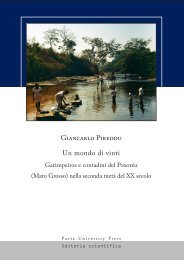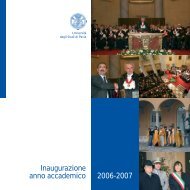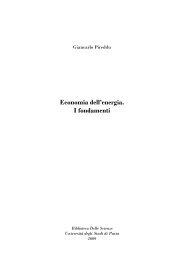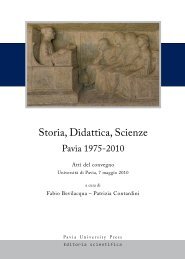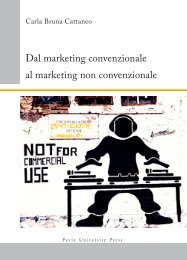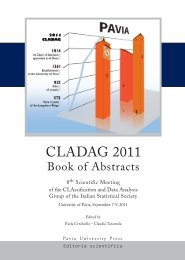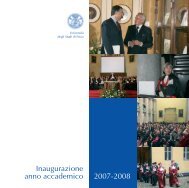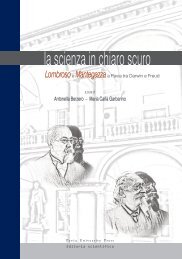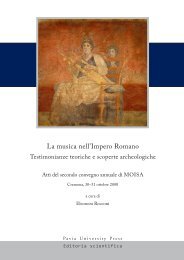Musica che affronta il silenzio - Scritti su Toru Takemitsu - Pavia ...
Musica che affronta il silenzio - Scritti su Toru Takemitsu - Pavia ...
Musica che affronta il silenzio - Scritti su Toru Takemitsu - Pavia ...
You also want an ePaper? Increase the reach of your titles
YUMPU automatically turns print PDFs into web optimized ePapers that Google loves.
168<br />
Angela Ida De Benedictis<br />
In much of Takemit<strong>su</strong>’s music the events develop in a dimension which is far removed<br />
from the sort of horizontal continuum characteristic of the majority of Western music:<br />
sounds are experienced moving in a stasis. Perhaps the closest equivalent in the West is<br />
in the experimentation of Morton Feldman, and it is no coincidence if Takemit<strong>su</strong> considered<br />
him one of the greatest friends among all his Western colleagues. One of his<br />
most inspired works for or<strong>che</strong>stra, Tw<strong>il</strong>l by Tw<strong>il</strong>ight, was composed in ‘memory of a<br />
man who was both a great friend and a great composer, Morton Feldman, who died in<br />
1987’ (Takemit<strong>su</strong> 1988). Separated by an ocean and a continent, the two composers<br />
rarely met, but those encounters left various traces whether in the published writings of<br />
each of them 24 or in the letters they exchanged (some, unpublished, are conserved in the<br />
Feldman Collection of the Paul Sa<strong>che</strong>r Foundation, Basle). The two men had various<br />
things in common, not least the pur<strong>su</strong>it of soundscapes dense with resonant s<strong>il</strong>ences,<br />
obtained above all by reiterating microcellular motifs or the slightest of aural figures.<br />
As always, Takemit<strong>su</strong> acted on <strong>su</strong>ch affinity and affection by importing Feldman’s music<br />
into Japan and disseminating it. In an essay he wrote commemorating Feldman in<br />
1992, Takemit<strong>su</strong> alludes to a recent performance of Coptic Light (which he himself had<br />
promoted) and the late composer’s music in general:<br />
Recently Morton Feldman’s music was premiered in Japan in a program by the<br />
NHK Ph<strong>il</strong>harmonic’s MIF (Music in Future – a title as cumbersome as Don Quixote’s<br />
armor). That was the first time Feldman’s or<strong>che</strong>stral music was performed<br />
in Japan. His Coptic Light reflects his interest in the pattern of Middle Eastern<br />
rugs, which have a regular and very fine harmony. As u<strong>su</strong>al his music was quiet,<br />
the sound reminding us of pleats of soft layered light, with time standing st<strong>il</strong>l. And<br />
yet an indescribably rich musical space emerged. [...] His music was without<br />
strong contrasts, unassertive, arising from his sensitivity – a unique minimalism<br />
without excesses. Thus the inner content of his music is clearly defined. He disliked<br />
excessive decoration. (Takemit<strong>su</strong> 1995b: 139-140)<br />
Clearly these last phrases could stand as an accurate description of Takemit<strong>su</strong>’s own<br />
music (just as, in saying that Takemit<strong>su</strong> has a natural rather than a historical vision of<br />
time, Feldman could well be talking about himself).<br />
The circumstances of their first meeting have never been properly clarified. In an<br />
unpublished letter to Feldman dated 19 December 1978 (reproduced here in the original,<br />
written when Takemit<strong>su</strong>’s English was st<strong>il</strong>l decidedly shaky) it emerges that they<br />
had already been friends for some time – Takemit<strong>su</strong> refers to previous visits he had<br />
made to the States – and that plans for Feldman’s music to be performed in Japan<br />
were already made:<br />
24<br />
Feldman, for example, made more than one reference to Takemit<strong>su</strong> in the lecture he gave in Darmstadt in<br />
1984 (Feldman 1985: 181-213).



